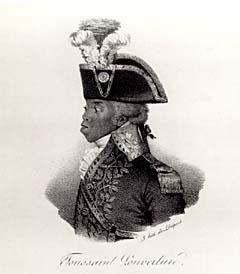|
 |
Volume No. 1 Issue No. 95 - Monday March 27, 2007
Haiti and the end of the slave trade
 By Gabriel Christian By Gabriel Christian

 Today we pay tribute to those who worked to end the Atlantic Slave Trade in 1807. As we commemorate the end of that practice, it is noble that we pay tribute to the humanitarians like William Wilberforce and others who were committed to end the odious practice. Today we pay tribute to those who worked to end the Atlantic Slave Trade in 1807. As we commemorate the end of that practice, it is noble that we pay tribute to the humanitarians like William Wilberforce and others who were committed to end the odious practice.
However, while lavishing praise on those who unselfishly gave their time in the anti-slave trade lobby, let us never forget the critical role of slave resistance and the Haitian Revolution in ending the slave trade--and later--slavery itself.
The Haitian Revolution was influential in slave rebellions in American and British colonies. In 1807, Britain became the first major power to permanently abolish the slave trade.
History reveals that the British political class was horrified by the Haitian Revolution and saw the further import of African captives as a security threat.
These new Africans, unbroken by years of subjugation and with the flame of liberty yet not doused, had played a critical role in the Haitian revolt. In the view of the British and other slavers, to maintain that flow of captive humanity would be to create the conditions for continued uprisings and resistance in their Caribbean colonies.
Slavery was not just a materialistic system; it also was about spiritual and mental domination - or "mental slavery" in the words of Bob Marley. Such spiritual liberty and leadership by those who remembered freedom in Africa was feared.
Those new Africans still harboured a spirit of resistance unbroken by years of servitude as some of their creolized (those born into slavery) counterparts were.
Fran�ois Mackandal was one such captive African who preceded Tousaint L'Ouverture and Dessalines. Like thousands of others, Mackandal was brought to St. Domingo from West Africa.
He rose in rebellion in 1757 and laid the basis for the Haitian Revolution of 1791-1804. That revolution spurred the uprising against colonial rule across the Americas. In 1815 Simon Bolivar travelled to Haiti for funding and arms.
It was with such funding and arms that he launched the rebellion that was to lead to the liberation of much of South America.
Hence the current affection shown to Haiti by Hugo Chavez who acknowledges their contribution to the liberation of Venezuela and the entire continent. The moral of that story is that freedom is not free; nor is it obtained as some charitable giving.
Liberty is not obtained by idle words or incessant talk. Rather, we gain our freedom by commitment, sweat and those who are prepared to make the ultimate sacrifice.
Therefore, it is appropriate that we remember the resistance of our own Negre Maron (Maroons) in the mountains such as Jaco, Balla and Congoree; those who burnt the suffocating cane fields and the Haitian Revolutionaries who made that sacrifice.
While we remember Wilberforce and the humanitarian component, let us never forget those who paid with their blood.
Just as today, another resistance movement will lead to the end of foreign occupation of other lands, let us continue to empower ourselves with knowledge of that history.
Let us commit to obliterate the last vestiges of that mental slavery which makes too many among us degrade, attack and character assassinate too many of our own; while waiting on manna from heaven or others to do for us.
Let us believe in ourselves and so unite, as the Haitians did in 1791-1804. It was that effort which led the way, which is why Haiti's freedom project has been under incessant attack by imperialism for 200 years, from within and without.
Without local accomplices such as Papa Doc, Baby Doc and others to divide the house, Haiti would have maintained that project. Let us continue to empower and unite our people.
Never forgetting the role we must play in attaining our own development and freedom. In so doing, let us always pay tribute to the Great Haitian Revolution this day and for all time.
|
|
| |
| Home | Welcome Message | Prior Issues | Feedback | Current Issue
|
| Contact Us | Advertise | About Dominica | Privacy Policy |
� Copyright 2002 TheDominican.Net.
Designed by Caribbean Supplies -- All Rights reserved
|
|
 |
 |
 |
 |
 |
|





